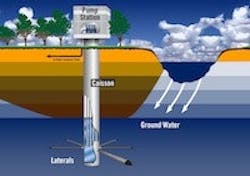Horizontal Collector Wells Provide Additional Water for Acapulco
In the late 1960s, Ranney Western Division, a predecessor to Layne’s Ranney Collector Wells group, went south of the border to install a new type of water collection system for the city of Acapulco located in the Mexican state of Guerrero.
This new type of well was a horizontal collector well, or Ranney Well, as referred to by the locals. After more than 40 years of operation, when it came time to expand the city and state’s potable water supply system by about 30 million gal per day (mgd), they opted to install two more Ranney Wells along the Rio Papagayo. The Ranney Well produced water of much better, more consistent quality as compared to the water obtained by the city’s aging direct river intake, during the wet season (June to November), when the Rio Papagayo is very turbid, with a high suspended load.
Horizontal collector wells, referred to as Ranney Wells after their inventor, Leo Ranney, have been around for 80 years. They consist of a concrete caisson 10 to 20 ft in diameter, and 30 to 150 ft in depth from which well screens (laterals) are projected horizontally into the aquifer from near the base of the caisson. When properly designed and constructed in alluvial aquifers near perennial streams, a single collector well may yield up to 50 mgd. A general schematic of a typical well is shown to the right.
In 2011, Layne de Mexico, the Mexican affiliate of Layne Christensen, was contracted by the project’s general contractor Grupo de Blanco to finalize the design and construct two horizontal collector wells. The two collector wells were a minor part of an extensive project to upgrade the southern portion of the Acapulco water distribution system by Comisión de Agua Potable Alcantarillado y Saneamiento del Estado Guerrero (CAPASEG), the Water Authority for the state of Guerrero. Locations for the two collector wells had been previously selected. Based on a review of existing data, Layne determined that additional information was needed to properly site and design the two units.
In November 2011, detailed test drilling commenced, using Layne’s AP 1000 Percussion Becker Hammer Drill. This drill rig offers a higher quality and faster method of drilling, sampling and well installation in difficult geologic formations, such as the coarse-grained highly variable alluvial deposits within the Rio Papagayo valley. The method uses only air, so geologic samples are not contaminated with drilling muds and representative borehole samples continuously returned up through the center of the inner barrel. The method also allows for a qualitative evaluation of water production as the boring is advanced. Based on the drilling, the sites for both wells were readjusted several hundred feet to better locations considering bedrock elevations, aquifer properties and constructability issues.
After the caisson and lateral design was finalized, Layne’s Ranney Collector Well division began construction of the wells in March 2012 by and completed construction in February 2013. Ranney is currently in the process of building two radial collector wells along the Rio Papagayo valley in the state of Guerrero, Mexico. The two collector well caissons (referred to as Pozo No. 1 and Pozo No. 2) are 16 ft in inside diameter and were constructed using the open caisson method with a hydraulic assisted pull down. Each collector well is designed for a pumping capacity of approximately 15 mgd.
Performance testing conducted in November 2012 (Pozo No. 1) and February 2013 (Pozo No. 2) indicated excellent results, with specific capacities of nearly 2,000 gal per minute per ft of drawdown; capable of meeting design yield with more than a 50% safety factor. These two Ranney Wells are among the most productive installed by Layne in the last 30 years and are expected to provide excellent quality water requiring minimal treatment for the Acapulco region for years to come.
Sam Stowe is district manager for Layne. Stowe can be reached at [email protected]. Lisa Sowder is marketing coordinator for Layne. Sowder can be reached at [email protected].
